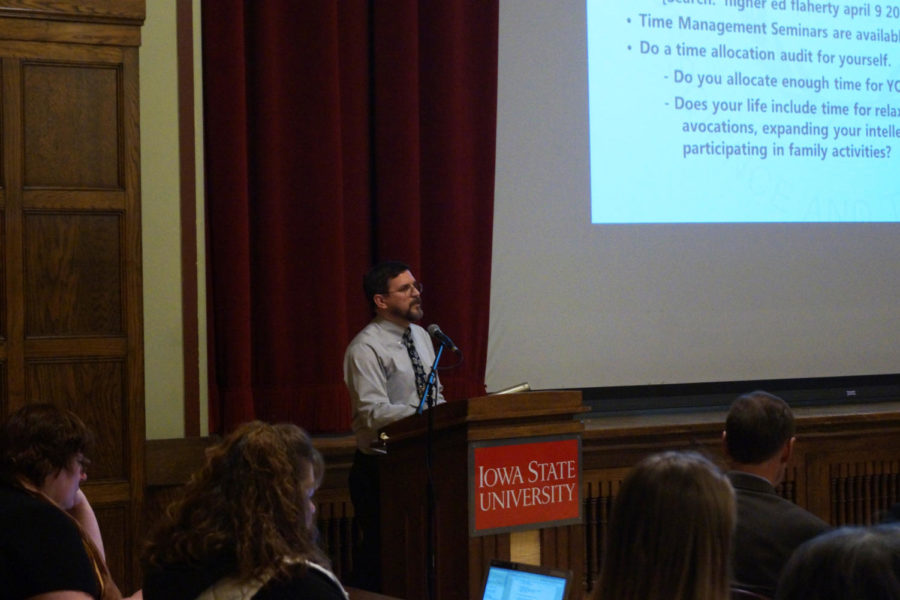Faculty Senate discusses how to manage workload
January 21, 2015
Don’t work quite as much, Faculty Senate President-Elect Robert Wallace told senate members.
Wallace said most faculty members work an average of 55-60 hours a week for a 40-hour-a-week job, which leads to stress and burnt-out faculty.
“The statistics keep piling up that we work more and more and more. Eventually, there’s going to be some stress created,” Wallace said. “Do you allocate enough time for you to do what you need to do outside your job?”
Wallace said he knows many faculty members who work a full day, go home to work a few more hours at 9 or 10 p.m., go to bed and wake up and go to work again.
“It’s the nature of the beast. With more and more commitments to service and to teaching, all that’s got to be covered in your job responsiblities, you cannot shirk those responsibilities,” Wallace said.
Wallace recommended faculty read an article by Colleen Flaherty called “So Much To Do, So Little Time.” Wallace said the article will help faculty learn ways to optimize their time to spend less time working but still be as efficient and hard-working as they need to be.
“Use the control you can muster to change those allocations on how you’re working for the university versus time you’re saving to decompress and pursue other interests,” Wallace said. “If you’re working all the time, that’s a psychological issue, that’s a health issue, that’s a wellness issue.”
Wallace said if faculty can manage to accomplish their professional goals and tasks during work time, they will be happier and be able to work more efficiently, which will benefit the university in the long run.
The Faculty Senate also voted not to pass a renaming of a program currently labeled as Operations Research to Operations Analytics.
The program of Operations Research is a master’s program that involves using mathematical simulation models to solve problems involving operational systems and the name is “somewhat antiquated,” according to the proposal.
Janis Terpenny, professor in industrial and manufacturing systems engineering and sponsor of the proposal, said calling the program “Operations Analytics” would show that the program is an “effective use of modern computing and high-volume data.”
“We thought with the university and the nation’s priority in the area of data and analytics, that this was actually a strategic advantage that the courses and the faculty and the students at Iowa State could rise to the occasion at that table,” Terpenny said.
All of the courses and faculty for the program already exist, so the program is really a no-brainer because it would use the resources the university already has, Terpenny said.
Though students have not been enrolled in this program for several years, Terpenny said senators in favor of changing the program name to “Operations Analytics” talked to constituents in the field who said they would hire students who graduated from the program.
However, some senators such as Veronica Dark, professor of psychology, said she believes the proposal is actually a new master’s degree proposal.
“If you actually take a look at it, it’s not really a name change. It’s the establishment of a new master’s,” Dark said. “When it came to the Senate floor last month, a question was asked about the program. The response was there were no students in this program. There have not been students in this program for quite a long time.”
Sen. Steven Freeman, professor in agricultural and biosystems engineering, said he agrees that the program would be an “easy sell” because the classes already exist and it would benefit students, but the proposal needs to come as a new master’s degree, not a name change.
Freeman said he doesn’t believe the current degree is still a degree since it is not listed on the course catalog and has not had students enrolled in 20 years.
Freeman said he is now wondering what other programs have slipped through unnoticed that the Senate should have eliminated.
Sen. Sarah Ryan, professor in industrial and manufacturing systems engineering and sponsor of the bill, provided a statement saying the Senate did not eliminate the program because the process would need to be approved by the Board of Regents and the Senate “would be in the position for the proposal to discontinue one program and simultaneously initiate a new program that is merely an update in a side-by-side comparison.”
The Senate did not pass the proposal.
The Senate also elected Jonathan Sturm, who ran unopposed as next year’s President-Elect.

















